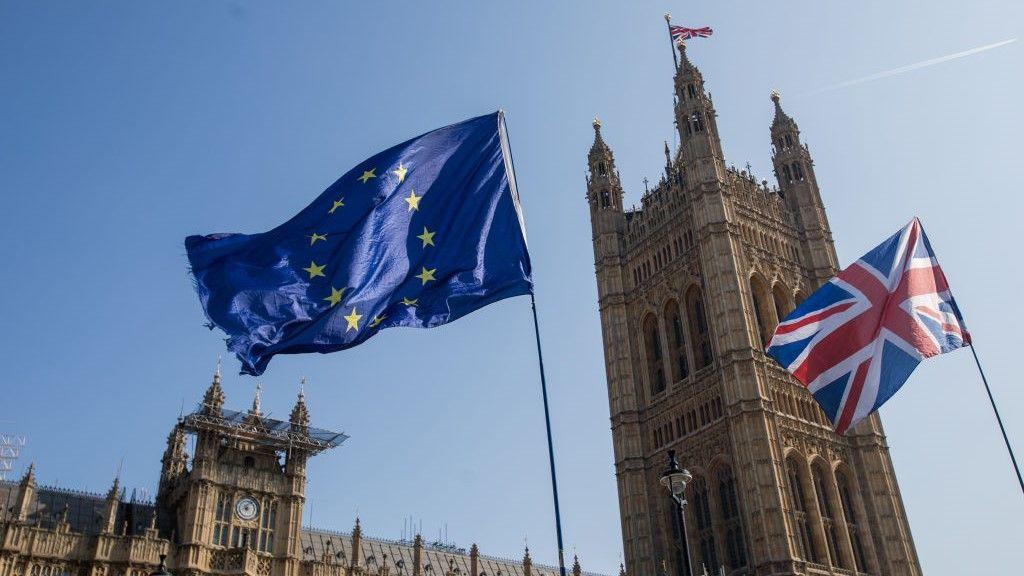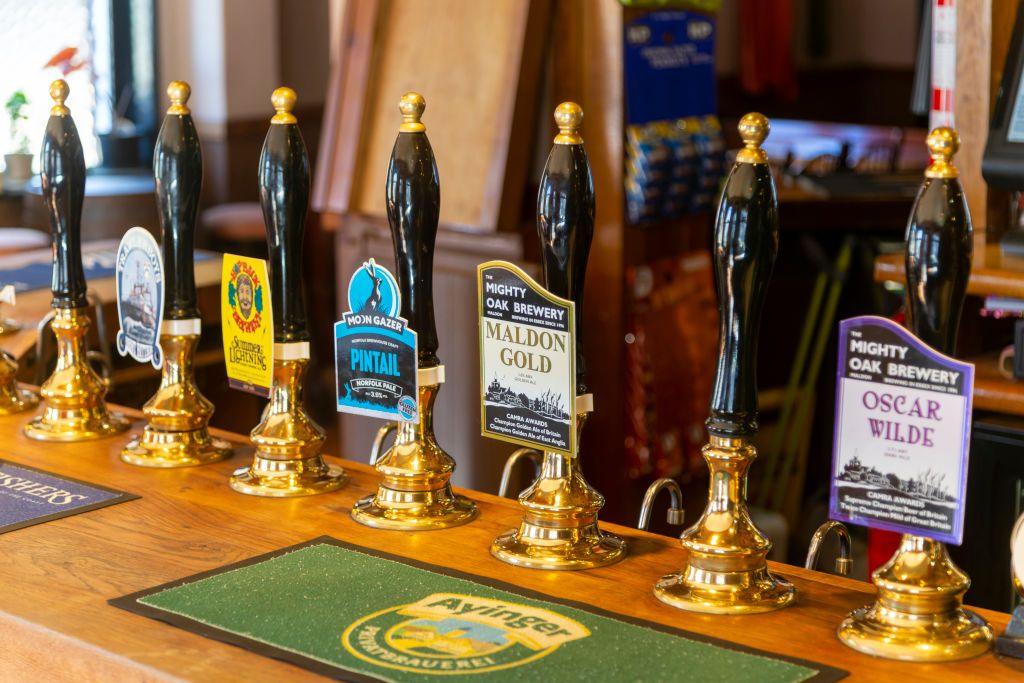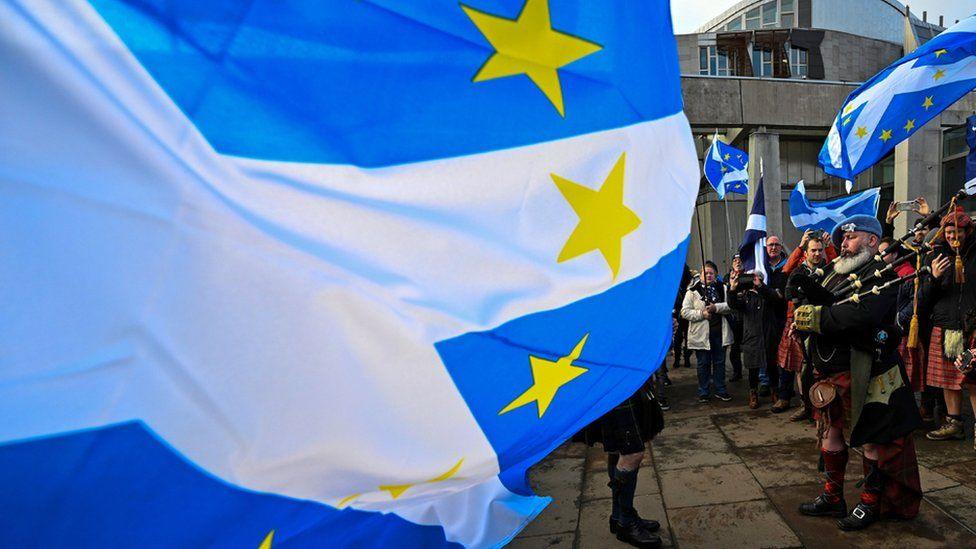Why are so few politicians talking about Brexit?

The battle for Brexit dominated the 2019 general election
- Published
Five years ago, the last general election was about Brexit. It was called to break the impasse at Westminster on how to "get Brexit done" and that became the then Prime Minister's slogan.
Boris Johnson had, you may recall, an "oven-ready Brexit". And he got the majority he required to put it in the legislative cooker.
But it was far from being "oven ready".
The key elements of the trade partnership deal were yet to be hammered out.
The price paid by the British to get a deal was a nasty shock to several sectors of the economy, from car-makers to farmers, whose post-EU subsidy regime remains uncertain. Trading food remains more difficult.
The price paid by the economy has been hard to quantify, because other factors have been a powerful drag on performance, notably the pandemic and the price inflation that followed.
So, eight years after the referendum and five years on from the Brexit election...
Why has Brexit been mentioned so rarely?
Watching the election campaign unfold over the past six weeks, you wouldn't know Brexit has been one of the most profound changes to affect Britain in decades.
Both the Conservative and Labour parties have judged it to be against their interests to go strong on the issue.
They believe people have made up their minds about it. Brexit dredges up divisions within their parties and alienates some voters, whatever the candidates say.
The issue is a reminder of some of the Tories’ more chaotic times in office, as well as pro-Brexit promises that crumbled to nothing much. From repatriated funds for spending on the NHS to British control of fishing grounds.
Many 'Leave' voters remain loyal to the cause and live in northern English constituencies which Labour hopes to win back from Tories, so the party is trying not to alienate them with negative messages about Brexit.
Other 'Leave' voters agree with the argument put forward by the Reform Party that Brexit was not done properly and the trading deal with the EU should be re-negotiated.
On the free-market right of politics, some wish the Liz Truss experiment with tax-cutting had been better executed, because they thought Brexit would create the conditions for a radically different type of state.
What are the parties offering?
Labour has chosen to avoid a fight with Tories about Brexit. It's done, says the party, and it's pragmatic to accept that. Labour is against re-joining the European Union, the single market or the customs union.
Tories want to "seize the benefits of Brexit" by signing further trade deals, speeding up infrastructure and "unblocking 100,000 homes, cutting red tape for business, and creating new fishing opportunities".
They want to repeal or reform EU regulations on the statute book. Having given up on a plan to repeal them all at once, they want the process to be half-way completed within two years.
They talk of the freedom to vary VAT rates, which is not allowed inside the EU. This would lead to lower rates for beer served in pubs and low-carbon home improvements.
Apart from being less interested in trade deals beyond the EU, Sir Keir Starmer's party wants similar outcomes; to boost growth with fewer planning obstacles. However, it doesn't see Brexit as the key to getting them.
It wants to negotiate better trading arrangements, removing barriers, form-filling, cost and delays. These could affect trade in food, with an agreement on veterinary checks on meat.
That, however, gets trickier if the UK is opening up to new markets through new trade deals being struck elsewhere.

Tax rates on beer and food are affected by relations with the EU
Labour also wants to agree mutual recognition of professional qualifications. That way, an engineer or dentist, for instance, could work in either the UK or EU.
While business representatives are broadly supportive, many want to go further, including opening the doors to more migrant workers.
In contrast, the SNP has been keen to raise the Brexit issue, with a pledge to re-join as soon as an independent Scotland is able.
The party claims that if the whole UK re-joined, it could unlock sufficient extra growth in the economy to generate £30bn more in tax revenue.
Lib Dems have set EU membership as a goal for the longer term. In the shorter term, they want to renegotiate the Brexit deal signed with the European Commission to ease the terms of trade.
They share with the SNP the aim of re-opening cross-border educational links for young people. A recent offer from Brussels to talk about this was rejected by both the Tories and Labour.
Meanwhile, the Brexit deal and trading arrangements in the subsequent Windsor Agreement between mainland Britain and Northern Ireland have been a prominent part of this election campaign in the province.
Could there be a better relationship with the European Union?
Labour hopes to open a more positive dialogue with EU members and the commission to get concessions that would ease up trade frictions. The SNP wants to start talks on re-joining.
As we learned from the Brexit process, it isn't as simple as declaring what one side wants and expects to get in a negotiation. The other side would have its own demands and foremost among them is likely to be free movement to and from the UK.
That is politically hard for any British government to give up, after it was so hard fought over in the referendum campaign.
The prospect of a populist anti-migrant campaign is one that the main parties both want to avoid, so they won't fuel that fire with talk of a return to free movement.

Immigration has become a crucial issue to the 2024 French election
Meanwhile, the EU is changing. There are new dynamics to any such talks. Italy has a populist, anti-immigrant party in power. France may have the same within three days of the UK election. Germany's government is weak and so the usual Berlin-Paris motor to the European project is also weakened.
The Brussels-sceptic Hungarian government has just taken over the rotating presidency. There is a focus on appointing the new commission for handover later this year. The role of the populists in that will be worth watching.
On the other hand, members of NATO have been in closer co-operation since Russia's invasion of Ukraine and the implied threat to eastern EU members.
The UK plays a prominent part in European defence, so smaller countries are more willing to listen when London comes calling.
How could 'independence in Europe' be the answer?
It is unlikely that the UK will ask to rejoin the European Union in the next five years.
And even if it did, the process for doing so is not very clear.
No member state had left the EU before Brexit, so no state has asked to rejoin.
The commission and member states could be expected to ask a heavy price and a clear commitment to ensure the UK is a team player in future.
It could look more favourably on an independent Scotland asking to join, if independence were to be achieved with a consensus around European Union membership.
That consensus is not guaranteed. The pro-independence movement is not agreed on EU membership. The Alba Party makes membership of the Euoprean Free Trade Association its priority, leading to a free trade agreement but not full EU membership, similar to Norway or Switzerland.
If an independent Scotland were to apply, the current rules would require it to comply with economic rules on having its own currency and central bank.
It would have to come within European Commission constraints on public spending deficits, government debt, and preparations to join the euro currency.
The boundary of the European single market and customs union would then be at the border with England, making it more difficult and costly to trade with Scotland's largest 'export' market.
None of these conditions is easy, the process is rarely quick.
And, as Brexit showed, the negotiators on the other side of the EU table are no pushovers.
- Published25 June 2024

- Published23 June 2024

- Published26 January 2021
